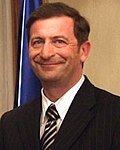Exit polls
According to exit polls, conducted by the Interstat agency for Radiotelevizija Slovenija, Social Democrats (SD) won the most votes, 32.02%. Slovenian Democratic Party (SDS) finished second with 28.04%. Other parties followed: Zares 10.05%, Democratic Party of Pensioners of Slovenia (DeSUS) 6.74%, Slovenian National Party (SNS) 5.58%, Liberal Democracy of Slovenia (LDS) 5.21%, and Slovenian People's Party (SLS) with Youth Party of Slovenia (SMS) 4.28%. New Slovenia (NSi) and Lipa, the parliamentary parties before the elections, did not reach the 4% limit. [1]
According to exit polls, conducted by the Mediana agency for POP TV, the results are following: SD 31.5%, SDS 27.7%, Zares 9.7%, DeSUS 7.6%, LDS 6.1%, SNS 5.8%, SLS-SMS 4.2%. The margin was not reached by NSi (2.6%) and Lipa (2.3%). [10]








